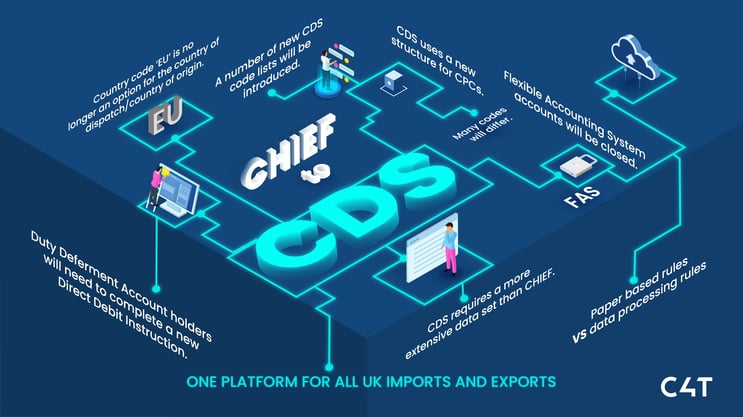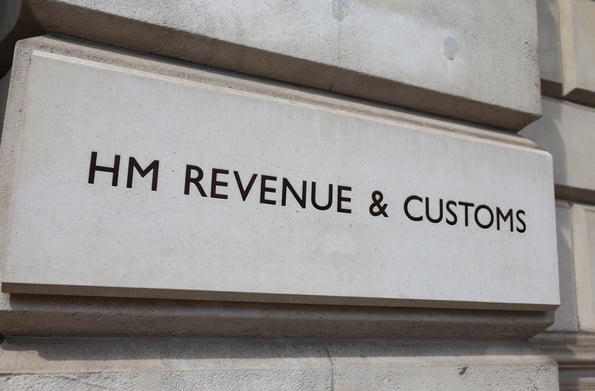The UK’s legacy customs system, Customs Handling of Import & Export Freight (CHIEF), is being replaced by Customs Declaration Service (CDS). CDS will handle all imports and exports arriving/departing the UK by land, air, or sea.
Why are CHIEF/NES being replaced?
CHIEF is the customs declarations system that has been used by HMRC for decades. Because of its age and complexity, it was not practical to try to adapt CHIEF to comply with EU customs requirements set forth in the Union Custom Code (UCC). CHIEF’s replacement, CDS, is a flexible, modular platform that is built to scale with the growth of international trade. According to the Directors General for Borders and Trade at HMRC, “CDS is a key part of the government’s plans for a world-leading fully digitised border that will help UK businesses to trade and to prosper.” The UK government also foresees cost savings for taxpayers as a result of the consolidation into a single system for customs declarations.
When will the switch to CDS take effect?
Imports using CDS
Since 31 October 2021, all imports from Rest of World (RoW) to Northern Ireland must now be declared using CDS. Following the closure of CHIEF imports on 30 September 2022, the requirement to file declarations using CDS extends to all imports into the UK.
Exports using CDS
Key Dates:
- From March 2023 – CDS exports via none inventory-linked ports
- September 2023 * – CDS exports go live for all locations (CSP inventory linked)
- November 2023 * – After the 30th, all export declarations must be sent through CDS, with CHIEF/NES winding down.
* subject to change
What do you need to do to prepare?
Right now, you need to make sure you have three initial steps ticked off your list:
- An Economic Operator Registration and Identification (EORI) number
- Your Unique Taxpayer Reference number
- Government Gateway account details; once notified by your software developer, register for CDS and authorise your software provider.
Further changes from CHIEF to CDS
UK Trade Tariff changes
CDS requires a more extensive data set than CHIEF. While there are consistencies between several of the key CHIEF/CDS Code Lists, such as Documents, Licences and AI Statement Codes, there are also some which differ, e.g., Port codes. In addition, a number of new CDS code lists will be introduced.
One key point to note is that CDS uses a new structure for CPCs, allowing for more than one 3-digit Additional Procedure code to be reported in Data Element 1/11. This means while some of the basic codes may translate across from CHIEF in the same format, e.g. 40 00 000, others will differ.
The UK Trade Tariff: Volume 3 is used for import and export declarations in CDS, including:
- Standard declarations
- Simplified declarations
- Supplementary declarations
The Volume 3 landing page provides access to the import and export guidance for the switch to CDS, including procedure codes, data sets, and declaration completion rules.

Country codes
As with CHIEF, as of 1 January 2022 the country code ‘EU’ is no longer an option for the country of dispatch/country of origin and the proper country code will need to be used, e.g., FR for France.
Payment processing
The way declaration payments are processed will also change in CDS, and you will need to make changes to your current payment methods for the following:
Duty Deferment Account holders will need to complete a new Direct Debit Instruction. However, you should not cancel your original Direct Debit Instruction. This will still be needed for deferred declarations made in CHIEF or other systems, i.e., ATWD, VAT 908.
Flexible Accounting System (FAS) accounts will be closed. You will automatically be issued a cash account when you register for CDS.
Frontier Declarations and Immediate Payments will be settled using:
- Deferment account
- Cash account
- Personal or corporate debit card or corporate credit card
- General guarantee account
- Individual guarantee
More detailed information can be found on the UK Government’s CDS Finance Fact Sheet.
UK Customs Compliance Made Easy
Are you thinking, “I’ve had enough of all these changes. Why can’t this be easy?” We’re glad you asked. That’s where CAS comes in. CAS is our digital customs management solution with legal compliance built in. We stay ahead of the curve so with each change that happens as a result of Brexit, the EU Multi-Annual Strategic Plan (MASP) for the Standardisation of Customs, e-globalisation in Belgium, customs reform in the Netherlands, or any number of other changes, your goods will continue to ship without delay. And CAS does this at a fraction of the cost of working with a customs broker.
For CAS customers, the switch to CDS will be relatively seamless, as both CAS and CDS align with the UCC data model. Each C4T customer’s data will be checked and, if any minor changes are needed, C4T will outline a migration plan well in advance of the transition.

